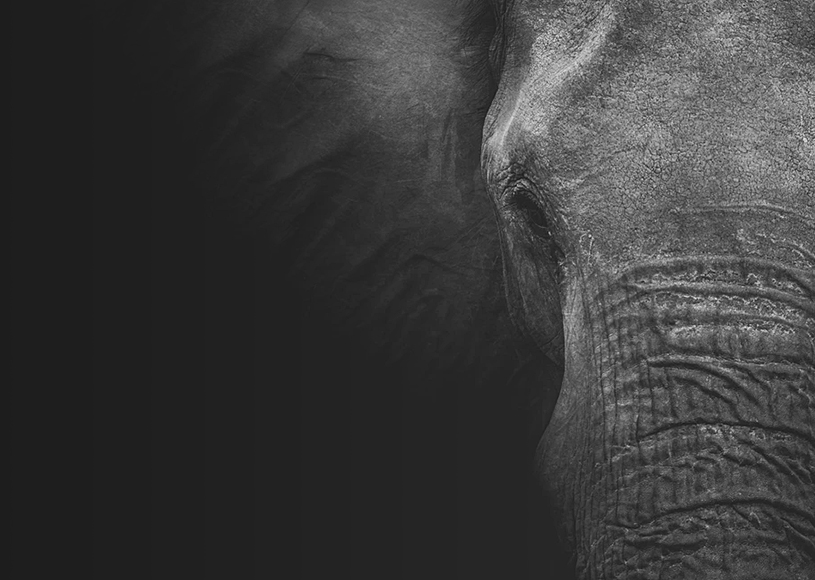
Police in Benin arrested three people for illegal possession of over 30 kg of ivory on August 12, 2014. TwoGuineans and 1 Beninese were arrested in a Cotonou hotel by the Judicial Police working in collaboration with the Beninese Forestry and Wildlife Department and Interpol, in possession of four elephant tusks found. The 30 kg ivory loot suspected to be coming from Gabon, investigation revealed, is part of a bigger booty of over 300 kg that is alleged to be held by an ivory trafficking network that spans across West and Central Africa.
All three are suspected to be members of this network that obtains its ivory principally from the Central African sub-region. A conservation group known as Conservation Justice, which is presently working with Beninese authorities provided valuable assistance that led to the unmasking and arrest of the suspected traffickers. Luc Mathot, who runs Conservation Jutice that has a wildlife law enforcement support project in Gabon and who is equally assisting wildlife officials in Benin to replicate the same wildlife law enforcement model there says “The products that were hidden in bags are from Nigeria but coming from Central Africa mainly Gabon “. The wildlife law enforcement model that is rapidly spreading through Africa under the network name “EAGLE” was originally started in 2003 when the Government of Cameroon signed a convention with a wildlife law enforcement body, The Last Great Ape Organisation (LAGA), to assist in the application of its wildlife laws.
Sources close to the operation in Benin say, it is only a small fraction of the stock held by the criminal gang, which has been operating from the Nigerian megalopolis, Lagos that hosts the biggest traffickers in West Africa and Central Africa. Luc Mathot says “The accused are major traffickers who work in a network in the West African sub-region”.

Ivory coming in mainly from Central Africa and especially from Gabon and Congo passes through Cameroon, and Nigeria which are the main transit countries en route to Benin, Togo and finally Asia where they command huge prices. This may explain why the EAGLE network that is expected to assist governments in effective wildlife law enforcement has been set up in these countries except Nigeria where contacts for such a project are well underway.
The three people were interrogated and brought in front of the Prosecutor of the Cotonou’s Court of First Instance and the operation by the Beninese authorities is seen as part of growing strategy to apply wildlife laws in curbing rising crimes against wildlife, specifically, the elephant in Africa. Conservationists say the extent of the damage is serious and most countries in the West African sub-region have seen their elephant populations wiped out. The situation has been rendered dangerous by the involvement of drug smuggling gangs and terrorists groups in the illicit ivory trade.
The main reason for this situation is the spiraling demand for ivory by the Asian newly rich and this has attracted huge profits for criminal syndicates and terrorists groups that are taking advantage of the weak wildlife law enforcement and penalties, in some countries, against wildlife criminals. In Gabon for example, the law provides for six months in prison for trafficking in ivory which many consider as too weak. Benin may just be at the beginning of its own wildlife law enforcement project but it has an even stiffer law, providing for a 5-year sentence to those convicted of wildlife criminality. Many see this is as a more commensurate punishment to a crime that is causing untold damage to the African elephant.
In any case, Benin still has some viable populations of elephants that need protection. Northern Benin has the largest elephant population in West Africa and needs a huge protection effort to avoid it becoming the target for trafficking networks. Benin may have taken a very important step in protecting its wildlife species, joining a framework of projects in what is fast becoming a truly regional effort in wildlife law enforcement. Benin has shown its commitment in this direction and the Beninese authorities have requested for cooperation with other countries to jointly fight ivory trafficking.
http://en.gabonews.com/environment/items/large-stock-of-ivory-coming-from-gabon-seized-in-benin.html
http://news.yahoo.com/benin-arrests-three-suspicion-ivory-smuggling-105650663.html
